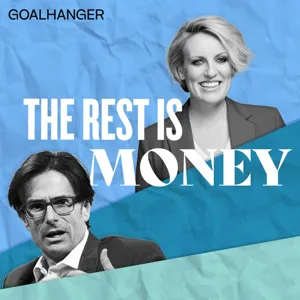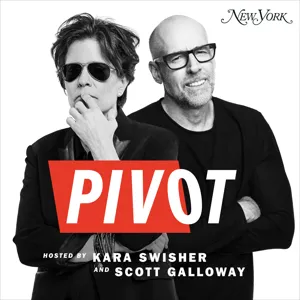Podcast Summary
Economic, political, and social instability in the Western world: The Western world faces significant economic, political, and social challenges, with the average UK household 20% worse off than European counterparts and public sector workers experiencing a severe pay squeeze, demanding urgent action to restore prosperity, democracy, and sanity.
The economic, political, and social instability of recent years reflects a failing system in the Western world, as highlighted in Robert and Kishan's book "Bust." Voters have expressed their dissatisfaction through various elections, demanding a new direction. The average UK household is now 20% worse off than its European counterparts, with public sector workers experiencing the most significant pay squeeze. These trends call for urgent action to reverse the decline and restore prosperity, democracy, and sanity. Shopping at Kroger, with its vast selection of affordable and inspiring meal options, can be a small victory in the face of larger economic challenges.
UK's challenges: Declining living standards and a fraying state: Despite internal and external pressures, the UK can make progress by acknowledging and addressing issues like the gap between public and private sector pay, institutional discrimination, long waits for healthcare and education, and mental and physical health issues. Embracing difference and unity is also crucial.
The UK is facing numerous challenges, both internally and externally, which have led to a decline in living standards and a fraying of the state's fabric. The gap between public and private sector pay has narrowed, but the UK is still falling behind in international comparisons. The police force is institutionally discriminatory, and there are long waits for healthcare and education. Mental and physical health issues have caused many to leave the workforce, and the UK's industrial strategy has been lacking in response to these pressures. Despite these challenges, the authors believe that progress is possible, and they emphasize the importance of acknowledging and addressing the issues at hand. They also emphasize the need to embrace difference and unity in the face of external threats. The authors, who have different generational and ethnic backgrounds, are united in their love for the country and their concern for its future.
Memories of the 1970s: A Time of Excitement and Liberation: The 1970s were marked by a sense of excitement and liberation, inspiring a belief in progress and upward mobility despite challenges like high inflation and societal change.
The speaker's experiences growing up in the 1970s were marked by a sense of excitement and liberation, despite the challenges of high inflation, industrial unrest, and societal change. They were inspired by the counterculture of the time, which challenged gender stereotypes, celebrated diversity, and paved the way for progress in areas like sexuality and race. The speaker's belief in a better future was influenced by both generational and ideological factors, and they were confident that societal progress would continue. They saw firsthand the impact of technological advancements and cultural exchange, and believed in their own upward mobility and the success of their peers. However, they also experienced naivete in underestimating the persistence of prejudice and discrimination. Overall, the speaker's memories of the 1970s are characterized by a sense of optimism and hope for the future.
Margaret Thatcher's Policies Marked a Turning Point in British History: Thatcher's policies led to economic growth but also destruction of industries and livelihoods, while Blair-Brown era brought stability and cultural icons, contributing to a sense of prosperity and distraction from political and social upheaval. Early political memory for Kish was the Iraq war amidst young people's apathy towards politics.
The economic, political, and cultural shifts beginning in 1979 under Margaret Thatcher marked a significant turning point in British history. Despite initial reservations, Thatcher's policies of privatization, liberalization, and tax reductions ultimately led to economic growth and prosperity for many. However, these changes came at a cost, with industries and livelihoods being destroyed in some areas, particularly Scotland. In contrast, Kish's experiences during the Blair-Brown era in the 1990s and 2000s were more stable and personally easier. Britain during this time was more at ease with itself, with cultural icons like Beckham, Britpop, and the Spice Girls representing a new generation without threatening the status quo. Global economic changes, consumerism, and the Internet further contributed to a sense of prosperity and distraction from political and social upheaval. Kish's earliest political memory was the Iraq war, which stood out as a moment of significance amidst the comfortably off young people's apathy towards politics.
UK's democracy remained robust despite challenges: Throughout the late 20th century, UK's democracy faced challenges but remained resilient, adapting to periods of political unrest, economic hardship, and widespread opposition to policies.
Despite periods of political unrest, economic hardship, and widespread opposition to certain policies, the UK's democracy remained robust and resilient throughout the late 20th century. This was evident during the protests against the Iraq invasion, where the voices of the people were not heard by their representatives, but there was still a national consensus that the system was superior to the alternatives. The banking crisis and rising anxiety about immigration led to a decline in election participation, but the focus was on strengthening rather than dismantling the democratic foundations. The split in the Labor Party resulted in the formation of the Social Democratic Party, which ultimately forced Labor to remake itself and paved the way for Tony Blair's leadership. The Thatcher administration's policies were controversial and led to significant economic hardship, but the UK's membership in the European Union and the resulting access to the European single market played a crucial role in the country's economic rehabilitation and subsequent prosperity. Overall, the UK's democracy proved to be adaptable and resilient, even in the face of significant challenges.
Thatcher's EU policies and their impact on UK economy: The EU market access boosted Thatcher's economic success, but post-2008 crisis, it led to economic stagnation, disillusionment among young, and Brexit vote
The success of Thatcher's policies in the UK was significantly influenced by the country's access to the EU market. However, after the 2007-2008 banking crisis, this advantage was lost, leading to economic stagnation and disillusionment among young people. This disappointment, fueled by dashed expectations and economic hardships, contributed to the Brexit vote and the current political unrest. The post-crash world has not delivered on the promises of prosperity for the younger generation, leaving them with insecure jobs, high living costs, and a lack of faith in the system. The long-term consequences of this trend could lead to further challenges to liberal democracy if leaders fail to address these issues.
Productivity crisis and regional inequality in the UK: The UK's productivity crisis and unequal opportunities have led to feelings of abandonment and resentment, potentially polarizing reactions and dashed expectations, necessitating a reevaluation of traditional economic approaches.
The UK is experiencing a productivity crisis, leading to stagnation and increasing inequalities. This has contributed to feelings of abandonment and resentment in regions like the Midlands and the North, which have seen fewer opportunities compared to the South. The psychological impact of witnessing the prosperity of others, amplified by social media, can lead to polarized reactions ranging from determination to give up. The promise of "leveling up" has so far failed to make a meaningful impact, and dashed expectations could lead to further disillusionment and even rejection of the current political system. The economic model that has driven historic growth may have been an illusion, and a sustainable solution requires a reevaluation of traditional economic approaches.
The Impact of Austerity on UK Productivity: Austerity measures led to a significant reduction in government investment spending, causing severe harm to the UK's productivity and prosperity. To improve, addressing investment, taxation, and wealth distribution is crucial.
While the UK's banking industry has faced challenges and its role in driving productivity and prosperity has diminished, another contributor to the fall in productivity growth, the impact of austerity measures implemented after 2010, is more fixable. The most damaging aspect was the significant reduction in government investment spending, which, combined with businesses reducing investment due to Brexit, has caused severe harm to the country's prospects. The example of increased investment in infrastructure in countries like France translates into higher productivity and prosperity, while the UK's antiquated public transport, congested roads, and crumbling schools and hospitals are causing both economic and social harm. The fall in investment since the Brexit vote in 2016 has led to an estimate of the UK economy being 4% smaller than it would otherwise have been. To improve productivity and growth, it's crucial to address the issues of investment, taxation, and wealth distribution. The UK's tax structure is suboptimal, and even with the tax burden at its highest level since the 1940s, public services are in deep trouble, and the poorest cannot afford a dignified life. The wealthiest should contribute more to those at the bottom, but the political will to implement tax rises is lacking.
UK Economy: Low Growth, Declining Productivity, and Rising Debt: The UK economy faces challenges of low growth, declining productivity, and rising government debt. Improving productivity and economic growth is crucial to prevent a potential sovereign debt crisis.
The UK's economy is in a precarious state due to a low growth rate, declining productivity, and rising government debt. The UK's tax burden is not unusually high compared to other developed countries, but the government must be cautious with taxation to avoid hindering economic growth further. The economy's underlying growth rate is around 1% per year, down from the pre-2008 crash rate of 3%. Productivity growth has also declined significantly. Government debt has tripled as a percentage of national income over the past 15 years, reaching nearly 100% of GDP. The most significant uncertainty is the future of the neutral interest rate, which could lead to a debt spiral if it remains higher than the economy's growth potential. The book emphasizes the importance of improving productivity and economic growth to avoid a potential sovereign debt crisis and its devastating consequences. The prospect of artificial intelligence driving a new industrial revolution is seen as the best chance to increase the growth rate significantly. However, the risks of AI must be managed carefully to ensure containable and preferable outcomes compared to the potential crisis.
We can't go back to the past: Focus on present opportunities for growth, let go of past regrets, and use experiences to inform future actions.
We cannot turn back the hands of time and return to a previous situation. This was emphasized during our discussion. It's important to understand that every experience, good or bad, shapes us into who we are today. Once we've moved on from a moment, we can't go back and relive it. This doesn't mean we can't learn from the past or use our experiences to inform our future actions. Instead, we must focus on the present and make the most of the opportunities that come our way. Letting go of the past and focusing on the present can lead to personal growth and a more fulfilling life. Additionally, dwelling on the past can be detrimental to our mental and emotional well-being. Instead, we should focus on the lessons we've learned and use them to move forward. Overall, the inability to go back to the past is a reality we all face, but it doesn't have to be a limiting factor. Instead, we can use it as an opportunity to grow and make the most of the present.






